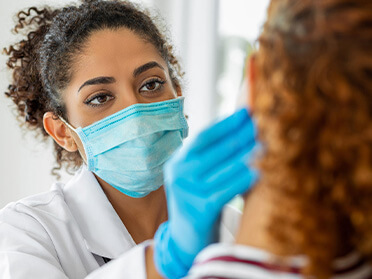
Infectious Diseases at UPMC
Infectious diseases are caused by microorganisms such as viruses, bacteria, fungi, and parasites. While many of these organisms normally coexist with the human body and play a role in maintaining physiological balance - as in the case of the gut microbiota - others, known as pathogens, can lead to acute, chronic, or asymptomatic infections.
Infections can be transmitted through multiple routes, including airborne, sexual, blood-borne, food-borne, or direct contact, and may affect any organ or system. In some cases, the infectious agent can remain dormant for years, contributing to silent transmission until clinical symptoms develop.
The clinical presentation of infectious diseases is highly variable and often non-specific. Symptoms may include fever, fatigue, transient skin rashes, gastrointestinal disturbances, or urinary symptoms. This heterogeneity may delay recognition, making specialist evaluation in infectious diseases essential for accurate diagnosis.
Book an Appointment
UPMC offers infectious disease consultations and diagnostic pathways at the following facilities:
- IRCCS ISMETT–UPMC (first visit for private patients only)
- UPMC Salvator Mundi International Hospital
When to Consult an Infectious Disease Specialist
A consultation with an infectious disease specialist is recommended in the presence of:
- Known exposure of infectious agents.
- Preventive screening or risk assessment.
- Recurrent or persistent, unexplained symptoms.
- Suspected acute or chronic infection.
- The need for targeted antibiotic, antiviral, or antifungal therapy.
An infectious disease consultation is also indicated for primary prevention, aiming to identify individual risk factors and define the most appropriate diagnostic and monitoring strategy.
Diagnosis of Infectious Diseases
Early diagnosis is essential to prevent complications and limit the spread of infection. Laboratory tests — including blood analyses and molecular diagnostics — allow for the identification of pathogens through the detection of specific antibodies, antigens, or genetic material.
The most frequently investigated infectious agents in our Centers include:
- Cytomegalovirus (CMV).
- Coxsackie virus.
- Epstein-Barr Virus (EBV).
- Hepatitis virus (HAV, HBV, HCV, HDV).
- Herpes simplex virus and Varicella-Zoster virus.
- HHV6 and HHV8.
- HIV.
- Parvovirus B19.
- Toxoplasma gondii.
- Treponema pallidum (syphilis).
Our specialists carefully assess the patient’s clinical presentation, medical history, travel history, and risk factors, selecting the most appropriate diagnostic tests and follow-up protocols.
Conditions We Treat
Thanks to advances in medical research and targeted therapies, many infectious diseases can now be effectively treated or controlled through personalized care pathways.
UPMC specialists manage a broad range of conditions, including:
- Bacterial infections, from common to complex.
- Chronic viral infections, including HIV and viral hepatitis.
- Emerging and re-emerging infectious diseases.
- Infections caused by multidrug-resistant microorganisms (MRSA, VRE, CRE).
- Infective endocarditis.
- Opportunistic infections.
At IRCCS ISMETT–UPMC, specialized care is provided for patients with end-stage organ failure and for organ transplant recipients, for whom prevention, monitoring and treatment of opportunistic and multidrug-resistant infections are crucial elements of the care pathway.
Patients We Treat
An infectious disease evaluation is recommended for:
- Candidates for, or recipients of, solid organ transplantation.
- Individuals presenting with symptoms consistent with a possible infection.
- Individuals requiring infection screenings for preventive purposes.
- Patients with autoimmune diseases or undergoing immunosuppressive therapies.
- People with specific epidemiological or clinical risk factors.
Early identification of the disease, selection of an appropriate targeted therapy, and a multidisciplinary approach are essential to achieving optimal clinical outcomes.
